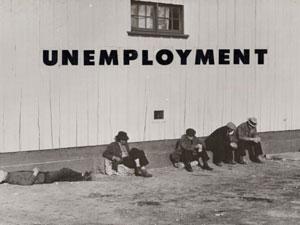The equality recession
(Image by Flickr user Wisconsin Historical Images (cc:by-nc-nd))
This story was originally covered by PRI’s Here and Now. For more, listen to the audio above.
Nearly everyone in the United States is being hurt by the so called “Great Recession.” But sociologist Katherine Newman points out that the pain inflicted is not equal. Low-skilled workers at the bottom of the educational spectrum are the hardest hit.
“The most powerful and damaging effects are being felt by young black men, who are now experiencing unemployment rates around 15 percent,” Newman told PRI’s Here and Now, “which is truly catastrophic.” That’s nearly double that of whites, and almost six points more than the total unemployment rate.
Forcing young people into an ailing job market can have long-term negative effects. In an article for The Nation, Newman points out that “the social problems that poverty experts worry about — teen pregnancy, high unemployment rates among young black men, low educational attainment — are all very sensitive to the economic condition of the country.”
Recessions can also have “scarring effects” on a person’s resume, especially for young people. Employers often view long-term unemployment with suspicion. And underemployment, not just unemployment, can have huge detrimental effects. According to studies cited by Newman, people who entered the workforce during previous recessions still faced significantly lower wages even 10 or 15 years later.
One problem, according to Newman, is how qualifications tend to creep up during recessions. Clerical jobs, for example were once available to people just out of high school. Now, college degrees are often required. Educated workers are sometimes forced to compete for jobs with uneducated workers, forcing uneducated workers out of the jobs.
The classic option for unemployed people is to go back to school, but even that is quickly fading as an option. The cost of higher education is skyrocketing, and low-cost schools are being flooded with applications to the point where they are having to turn people away. It is “one of the greatest tragedies of the great recession,” Newman said, “that the major and logical route to reemployment is closing on so many people.”
Some hoped that rising demand from China and India would solve the problem for Americans. And though Chinese people are buying more, Newman points out that they aren’t buying from Americans. They’re buying from factories in their hometowns or nearby.
In fact, because of China’s one-child policy, the country is facing something like a labor shortage problem. Wages are going up, and workers are organizing strikes for more fair labor practices. In response, some companies are looking to countries like Bangladesh, instead of China, for a cheap labor force.
This means that the United States, for the most part, is on its own in the effort to restore its economy. The US economy is still enormous, but it is in danger. According to Newman, “A lot of our fortune depends on whether we can start putting people back to work, so that the demand will rise for what we produce in the United States.”
“Here and Now” is an essential midday news magazine for those who want the latest news and expanded conversation on today’s hot-button topics: public affairs, foreign policy, science and technology, the arts and more. More “Here and Now”
